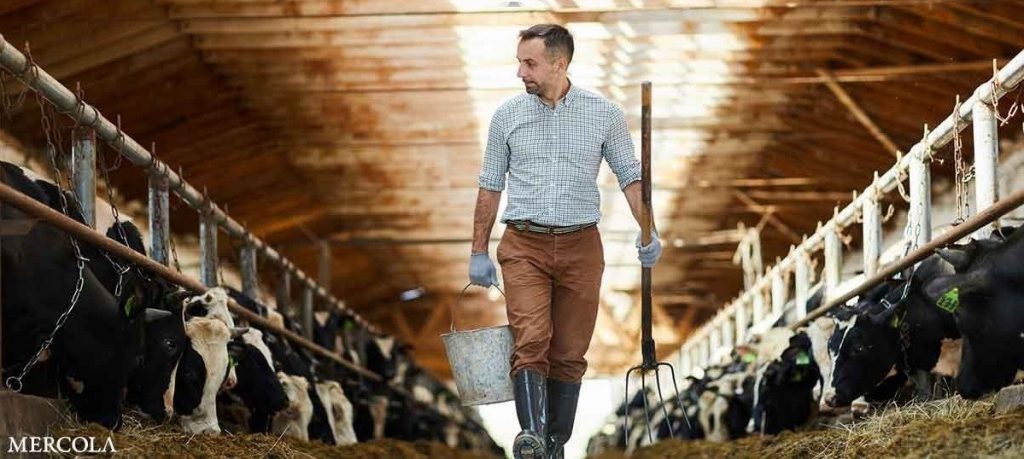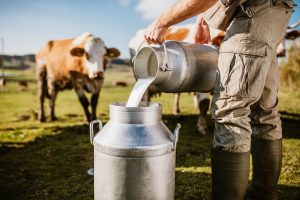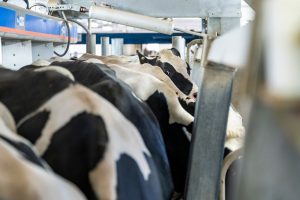
STORY AT-A-GLANCE
Dean Foods, one of the biggest dairy companies in the U.S., has filed Chapter 11 bankruptcy
Dean Foods is in talks with Dairy Farmers of America (DFA), the largest dairy co-op in the U.S., about a possible acquisition
The merger would pose a serious conflict of interest for dairy farmers, as DFA is supposed to advocate for farmers but would end up being a processor
As such, DFA would have an interest in keeping milk prices low, at the detriment of the more than 13,000 dairy farmers they represent
Many are asking what “killed” Dean Foods, blaming its downfall on everything from plant-based milk alternatives and millennials’ apparent distaste for milk to increased availability of other beverages
What’s truly responsible for declining milk consumption, however, is the shift of milk from a fresh, wholesome raw food to one that’s ultraprocessed, homogenized and the product of concentrated animal feeding operations (CAFOs)
In November 2019, Dean Foods, one of the biggest dairy companies in the U.S., announced it had filed Chapter 11 bankruptcy,1 sending a wave of uncertainty through an already shaky milk industry. Dean Foods was one of the primary milk processors and distributers in the U.S., purchasing milk directly from dairy farms.
If farmers don’t sell their milk directly to a processor like Dean Foods, they can also sell it to dairy cooperatives, which negotiate sales of the milk to processors and retailers on behalf of its members. Dairy co-ops have been rapidly consolidating, however, leaving farmers with few options for sales — Dean Foods among them.
Alongside the bankruptcy, the dairy giant also announced that it was in talks with Dairy Farmers of America (DFA), the largest dairy co-op in the U.S., about a possible acquisition. The merger would pose a serious conflict of interest for dairy farmers, as DFA is supposed to advocate for farmers but would end up being a processor.
As such, they’d have an interest in keeping milk prices low, at the detriment of the more than 13,000 dairy farmers they represent.2
Dean Foods Bankruptcy Could Worsen Milk Monopoly
Speaking with New Food Economy, Peter C. Carstensen, a former attorney for the antitrust division of the U.S. Department of Justice, explained that DFA acquiring Dean Foods raises serious questions about anticompetitive activity. “The problem with DFA is the conflict of interest that will result from [trying] to lower prices to farmers in order to increase their revenue as a milk processor,” he said.3
DFA already controls 30% of the U.S. milk production, which means acquiring Dean Foods could easily lead to a monopoly over the market. “What you’re going to see is increased risk of tacit collusion on the consumer side, raising the price of milk for consumers,” Carstensen continued.4
It’s not the first time DFA and Dean Foods have raised such suspicions. In 2013, DFA paid a nearly $159 million fine to settle a 2007 lawsuit alleging DFA conspired with a number of companies to suppress milk prices by closing bottling plants and stifling competition. In 2010, Dean Foods also paid dairy farms in the northeast a $30 million settlement as part of an antitrust lawsuit.5
Milk prices are already low, causing many dairy farmers to close their businesses. In Wisconsin, for instance, farmers in 2019 are getting nearly 40% less for their milk than they were in 2014. Nearly 700 dairy farms closed in the state in 2018, most of them small operations.6 Meanwhile, in 2018 the Organic Consumers Association reported:7
“Dairy farmers are suffering because the companies that send their milk to the grocery store refuse to pay them what it costs them to produce the milk. On the West Coast, cooperatives created to sell dairy products have been accused by their members of pocketing millions of dollars in an elaborate accounting scheme.
Meanwhile, farmers in the Northeast have filed a lawsuit against their coop, Dairy Farmers of America, and Dean Foods, the nation’s largest milk processor, alleging the companies conspired to monopolize the market and drive down prices, knowing their member farmers would have nowhere else to sell their milk.
Milk prices are so bad this year — farmers are getting the same price they got 20 years ago — that at least one milk processor sent farmers phone numbers for suicide prevention hotlines and other mental health services along with the latest market forecasts.”
Ultraprocessed Homogenized CAFOs Killed Milk
Many are asking what “killed” Dean Foods, blaming its downfall on everything from plant-based milk alternatives and millennials’ apparent distaste for milk to increased availability of other beverages.8 Even the relatively newfound popularity of drinking water has been pinpointed as a scapegoat.
Dean Foods president and CEO Eric Beringause said in a statement, “Despite our best efforts to make our business more agile and cost-efficient, we continue to be impacted by a challenging operating environment marked by continuing declines in consumer milk consumption.”9
The fact is, milk consumption is on the decline. In 1975, Americans consumed 247 pounds of fluid milk (about 29.6 gallons) per person, compared to 146 pounds (or about 17.5 gallons) in 2018.10
What’s truly responsible for this decline, however, is the shift of milk from a fresh, wholesome raw food to one that’s ultraprocessed, homogenized and the product of concentrated animal feeding operations (CAFOs).
On CAFOs, milk can be produced in filthy conditions, then heated until all the pathogens are gone. Never mind that, along with killing “germs,” pasteurization kills off beneficial organisms in the milk and prevents natural souring (while naturally soured milk can still be consumed, pasteurized milk past its prime will quickly go bad).11
Rather than forcing dirty and dangerous CAFOs to clean up their acts, the FDA has waged a war against raw milk producers — those who are typically producing milk using far healthier, more humane and more sustainable methods than the industrial dairy industry ever could.
As CAFOs became the norm for dairy farms (even in idyllic-seeming dairy states like Vermont), farmers were forced to grow their herds and increase milk production using artificial (drug and hormone-based) methods, among others (like feeding cows an unnatural amount of grain-based food, 24-hour confinement and increased number of milkings per day).
Meanwhile, some people who experience gastrointestinal upset or other health problems when drinking regular CAFO dairy do fine when drinking raw, organic grass fed milk, which is far easier on your digestive system. Raw, grass fed A2-only milk may be even more ideal.
Raw Milk Advocates Win Lawsuit
In the U.S., raw milk is the only food banned from interstate commerce, which means small farmers cannot transport it across state lines, and even in states where farmers are allowed to sell raw milk directly to consumers from their farms, advertising bans may be put in place, allowing farmers to be punished with fines or jail time if they advertise their raw milk for sale.
In many cases, this effectively makes it impossible for farmers to successfully market and sell their raw milk, so farmers have been fighting back against this type of prohibitive legislation. In Kansas, for instance, a statute enacted in 1967 banned any advertising of raw milk, except for signage on the farm.
However, two goat farmers sued agriculture secretary Mike Beam, asking for the state to stop enforcing the statute. “Then an unusual thing happened,” Food Safety News reported. “The state agreed with the goat farmers”:12
“Under the terms of the settlement, the parties agree the advertising ban violates the First and Fourteenth Amendments to the U.S. Constitution and the Kansas Constitution Bill of Rights Section 11 and is therefore unenforceable.”
Kansas Attorney General Derek Schmidt further stated:13
“The statute restricting advertising of raw milk does not comply with the U.S. Supreme Court’s modern application of the First Amendment to commercial speech and is plainly unconstitutional …
While we typically provide a rigorous defense for every statute enacted by the Legislature, in this case where there exists no plausible legal defense the better and less-costly course of action is for the Department of Agriculture to work with the Legislature to modify the statute so it complies with the U.S. Constitution.”
Fear and Control Aim to Keep Raw Milk an Illegal Food
There was a period of time, from 1860 to the 1920s, when raw milk went through what Mark McAfee, founder and chairman of the Raw Milk Institute (RAWMI), describes as a “dark age.”
The cow diets, combined with unsanitary conditions, raw sewage mixed with water and lack of refrigeration led to the spread of diseases like tuberculosis and typhoid. A lot of people died from raw milk that came from these unsanitary distillery dairies raising malnourished cows.
Around this time, the “swill milk” scandal also occurred, in which dairy cows being fed grain distillation remnants and raised in poor conditions produced diseased milk, which was then mixed with chalk and sold as fresh. A reported 8,000 children died as a result, which increased consumer support and industry acceptance of pasteurization.14
In the modern day, fear is still used as a tool to promote restrictions to your right to choose what to eat. A bill introduced in Tennessee by Sen. Richard Briggs, R-Knoxville, Senate Bill 15 (SB15), even suggests amending a Tennessee code relating to milk products to make it illegal for a partial owner of a hoofed animal to drink the milk from that animal.15
While graciously allowing a person who is the sole owner of a hoofed mammal to drink the milk personally, the bill is aimed at snuffing out herdshare programs. Private agreements called herdshares are often formed between farmers and individuals, which entitle you to the benefits of owning a “share” of a cow, such as a certain amount of milk each week.
However, SB15 not only would make it illegal for herdshare owners to obtain raw milk but also would make it against the law for the farmer running a herdshare to drink milk from their own cow (or other hoofed mammal), as they would not be considered a “sole owner.”
SB15 is poised as a bill to protect the public welfare from the “risks” of drinking raw milk, but raw milk is a nutritious and safe food when it comes from cows raised on pasture.
Briggs reportedly introduced SB15 to close the herdsharing “loophole” after 10 children in the state were sickened by E. coli that was blamed on drinking raw milk from a Knoxville shareholder dairy. But according to Weston A. Price, “no E. coli was found in any of the dairy’s milk that public health officials tested.”16
Raw Milk Cheese Is Also Targeted
In her book, “Ending the War on Artisan Cheese,” food scientist Catherine Donnelly states that fears of raw milk are threatening the artisan cheese industry, which uses raw milk in many of its cheeses. She explains that traditional cheesemakers carefully source raw milk from high-quality sources to ensure a safe and delicious end product.
In an interview with Eater, Donnelly states, “There are careful standards that cheesemakers pay attention to because if they don’t start out with the best quality raw materials, they’re not going to end up with a good cheese. Paying attention to the microbiological quality of the raw milk is really, really critical. The raw milk, the starting material, has to be of good quality or you’re not going to have a sellable product.”17
What’s more, Donnelly notes that more illness outbreaks are associated with processed products that have been pasteurized, while the FDA favors Big Dairy at the expense of the smaller, artisan producers:18
“Who has the ear of the FDA when regulations are being promulgated? It isn’t the small, rural farm people who have a seat at the table, influencing policy. It’s the large, multinational corporations who are looking at their bottom line and profit.
If those voices are having input on regulations, there isn’t a holistic approach for the FDA to look at something other than a one-size-fits-all approach to regulations. Cheese makers have no market for their product if it’s contaminated and they’re making their customers sick.
But I would argue that a small-scale producer has much more control over the safety of that process than some of these large-scale industrial plants, where there are lots of post-pasteurization processes like shredding, and cutting, and repackaging, and lots of opportunities for exposure to contamination.
That’s why we see more outbreaks associated with industrially processed products, as opposed to artisan.”
While in the U.S. cheese must either be made from pasteurized milk or held for 60 days prior to sale, Europe considers raw milk essential to such delicacies as traditional French cheese. Pennsylvania cheesemaker Sue Miller explained to Mother Nature Network:19
“There are all these great enzymes living in the milk when it’s raw that create flavor profiles. When milk is pasteurized, they get extinguished so you have to add cultures to accentuate the flavors of the milk …
I’d love for people to really try raw milk cheese. In Europe people don’t want pasteurized cheese. They know how good raw milk cheese is.”
Support Real Dairy and Your Right to Food Freedom
Ultimately, whether you drink milk or not, and whether it’s raw or pasteurized, is a personal choice — and it should remain that way. You have the right to choose what to eat, regardless of the government’s opinion on what’s healthy or what’s not. Further, by choosing raw milk that comes from small, grass fed farmers, you can support the small operators that deliver farm-fresh foods to local residents.
As long as farmers are prevented from selling to consumers directly, processors can and do price fix the market, ultimately leading to corporate monopolies, consolidation of CAFO dairy farms, a degradation of food safety and quality, and the intentional destruction of small, family dairy farms.20























